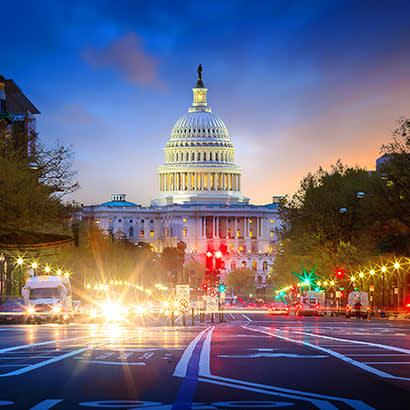
For an enhanced digital experience, read this story in the ezine.
As we enter 2024, the 118th Congress will head into its second term. Convening in January 2023, this Congress has been tumultuous from its outset, marked by political divisions with Democrats in control of the White House and the Senate and Republicans taking back control of the House.
Notably, there also have been significant divisions within the House Republican Caucus, from the very beginning of the session with the weeks-long series of votes to elect then-Speaker Kevin McCarthy, wrangling over compromise with Democrats to raise the debt ceiling, and now ongoing negotiations over federal spending levels that have led to McCarthy’s ouster and replacement with Speaker Mike Johnson. Wars in Ukraine and Israel-Gaza, attempts to repeal portions of President Joe Biden’s climate agenda, efforts to pass a new Farm Bill and more also have taken center stage.
Meanwhile, NRPA has been hard at work advancing policy wins for local parks and recreation. Early in 2023, we defeated an effort to prohibit congressional earmark funding from being used for park and recreation activities, and throughout the year, we fostered the advancement of the Outdoors For All Act as a part of the broader America’s Outdoor Recreation Act package. We also have fought to protect and expand important sources of federal funding for parks and recreation in final fiscal year 2024 (FY24) spending legislation.
In 2024, we will continue and grow these efforts to ensure local park and recreation professionals have a strong voice in Washington, D.C. Some key items to be on the lookout this year are summarized below.
Spending Negotiations
While Congress managed to avert a government shutdown not once but twice in 2023, most recently passing a continuing resolution (CR) at status quo spending levels before leaving town for Thanksgiving, these negotiations will be at the forefront in January. The CR took a “laddered” approach, meaning that it split up the various spending bills that Congress must pass into two deadlines — January 19 and February 2.
The key dynamic at play is a nearly $100 billion split in topline spending levels that leadership in each of the two chambers is proposing. Congressional Democrats and Senate Republicans are aiming to follow the topline levels mandated under the summer 2023 debt limit legislation brokered by President Biden and then-Speaker McCarthy, while House Republicans, spurred by members of the House Freedom Caucus, are seeking to enact even steeper cuts.
Complicating matters further is whether foreign aid will be provided to Israel, as well as the potential for additional foreign aid to Ukraine. House Republicans are split on the Ukraine question, with many urging for no further spending, and others asserting that further aid should be contingent on measures related to U.S. border security. The dealmaking on these variables that takes place this month will be instructive for how a final spending bill shakes out.
Most of NRPA’s top priorities in the FY24 spending bill, including Land and Water Conservation Fund stateside assistance and the Clean Water State Revolving Fund green infrastructure set-aside, fall within the Interior, Environment, and Related Agencies spending bill, which has a deadline of February 2 for final passage. NRPA will continue its advocacy work to cut through the noise and ensure key park and recreation priorities get the funding they deserve.
Continued Implementation of Major Climate and Infrastructure Laws
We are now in year three covered under the landmark Infrastructure Investments and Jobs Act (IIJA) and year two covered under the Inflation Reduction Act (IRA), the most comprehensive climate bill in U.S. history.
Through both laws, beneficial investments for local park and recreation stakeholders are being made across the country. IIJA increased funding to key infrastructure programs, such as those funding green infrastructure and active transportation infrastructure, and IRA has provided new pots of funding for activities related to climate and environmental justice — such as an urban tree planting initiative, grants to address urban heat islands and more.
Federal agencies and Congress are working together to maximize the benefits of both bills. Specifically for the IRA, given that many of the streams of funding in the legislation were brand new, federal agencies are continuing to roll out program guidelines and funding announcements in 2024. NRPA will continue to stay on top of these announcements and provide relevant updates for how NRPA members can access and implement funding.
Election Year
2024 is an election year for all of the House, a third of Senate seats, and, of course, the presidency. Lawmakers will have a particularly keen eye to the politics of their actions. In election years, compromise on legislation typically declines during the months leading up to November.
Election years — and particularly the August recess — also present great opportunities to invite your members of Congress to do a site visit. NRPA encourages its members to leverage this, as lawmakers are looking to get themselves out into their states and districts during this crucial time, which presents an important occasion to build relationships and goodwill with lawmakers, developing them as park and recreation policy champions.
NRPA is primed to advance key policy priorities for the local park and recreation sector. Be on the lookout for alerts from our team so that you can get involved by engaging with your elected officials to support key priorities, and to pursue federal-funding opportunities.
Dan McCarthy is Senior Manager of Advocacy at NRPA.

